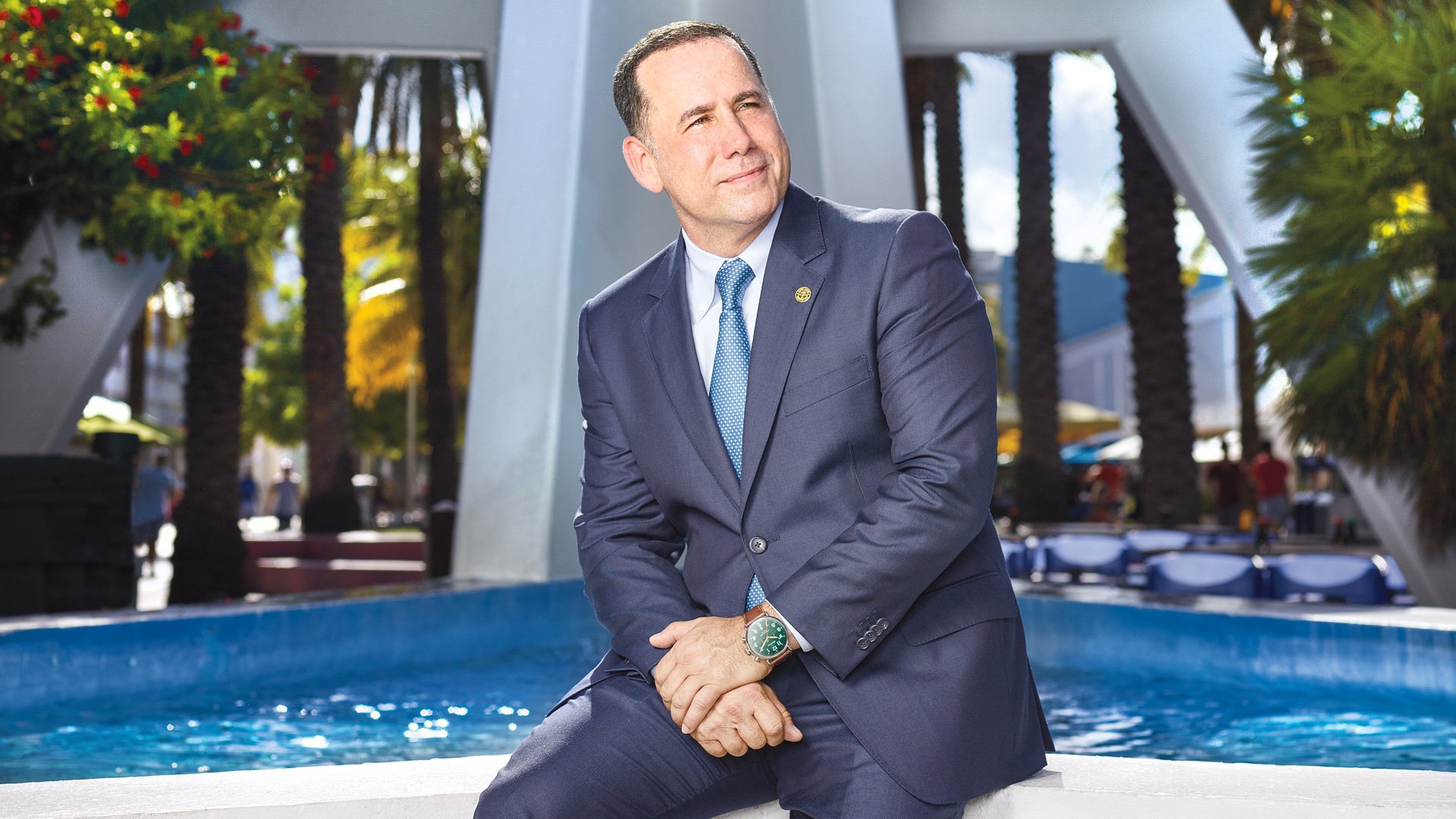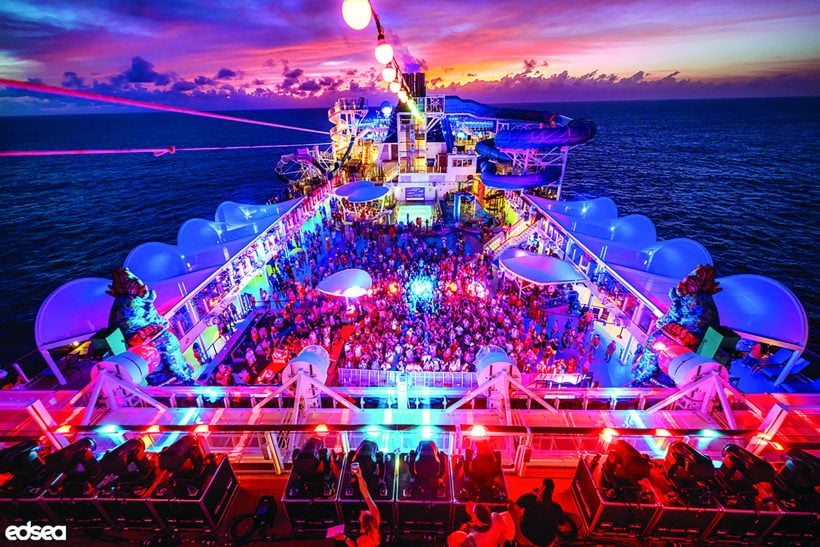5 years ago, Worth profiled Miami Beach businessman Philip Levine, who had stumbled into a job giving talks to cruise ship tourists and parlayed that into a company called Onboard Media, which created content—everything from magazines to in-cabin TV programming—for cruise lines. In 2000, Levine sold Onboard to Louis Vuitton Moët Hennessy for a reported nine-figure sum. He lived well, invested in some real estate and acquired a reputation for dating models. The question our profile asked: What would Philip Levine do for his second act?
It took a while, but last year we finally found out: Levine ran for mayor of Miami Beach. Decrying the incompetence and cronyism of local government, Levine, who had never run for political office before, spent $2 million in his quest to govern a city of 90,000. In November 2013 he won with just over 50 percent of the vote.

To the surprise of some naysayers who charged that he was a wealthy dilettante, Levine threw himself into the job, bringing an energy and optimism to the mayor’s office that most residents seemed to agree had been seriously lacking in the prior administration. Why would a wealthy man change his life so dramatically, and what did the new mayor hope to accomplish?
It seemed a good time to return to Miami Beach and ask him.
Q: You’re the mayor of Miami Beach. How did that happen?
Well, I did two things since we last spoke. Number one, in 2011 I launched a company called Royal Media Partners, similar to what I did before, with one big client, Royal Caribbean, and all their brands.
Were you bored? Restless?
Every day had become a Saturday—I wanted more purpose. I love the cruise ship industry, and I saw an opportunity to get back into it.
In our original article, you said, “I never wanted to be the richest man in the world, I just wanted to be the most comfortable man in the world.” It sounds like comfortable wasn’t enough.
There are two ways to define “comfort.” There’s comfortable wealth-wise, which, thank God, I have been for many years. But there’s also comfortable in terms of feeling that you’re being a productive member of society. I was doing some real estate development, but real estate isn’t as fast moving. When you’re in the cruise ship industry, you get addicted to it.
Did it feel odd to return to a business you’d left?
It was starting from zero again. Hiring people. Negotiating an agreement with Royal Caribbean. Renovating our corporate headquarters. It was exhilarating. We did it during the great recession, which was a great time to hire people and negotiate deals. And it’s been incredibly profitable.

So if the business is fun and profitable, why run for mayor?
I just always thought it’d be something I’d like to do when the time was right for me. And then, of course, I have a tremendous friendship with former President Clinton. Being around him and around world leaders, and seeing all the good that he’s done with the Clinton Global Initiative, everything else that he’s done in his life….
So you talked to Clinton about running?
Oh, yeah. And he always said, when it’s right, you’ll feel it, you’ll do it.
Was it a difficult decision?
It’s a little bit like business. In business or in real estate I could look at 99 opportunities and say no to all 99. Then the 100th one, I don’t have to think about or analyze. I know it’s time. And in the beginning of 2013 in Miami Beach, I saw the opportunity.
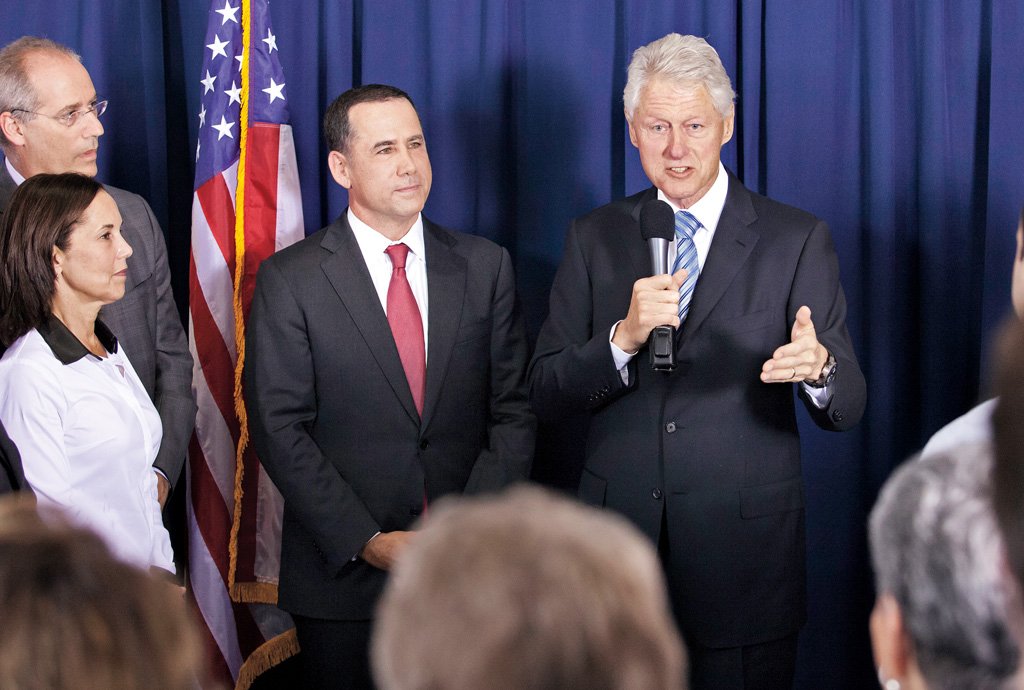
Let’s jump back a bit. I’m imagining a conversation with Bill Clinton about running for office. Would Bill Clinton also say, ”Listen, there are some things about public office that aren’t so great?”
I will tell you the words of advice he gave me. Two things. Number one, do not run for office unless you’re prepared to lose.
Meaning?
That if you can’t handle a loss, don’t run. It makes you think about it. If I run and I don’t win, will I be OK?
And the second thing?
That you don’t win an election because they don’t like the other guy. You win an election because you inspire people to vote for you.
What I was really driving at was the personal life aspect of running for office. You’re a single guy with a reputation for dating beautiful women. Did that give you pause?
I’m not married, so for me, it’s not an issue. I don’t have a criminal record. I’ve got a great credit history.
You weren’t worried that someone would try to dig up dirt on you?
Well, before I ran, I not only did a full background check on my three main opponents, I also did an extensive background check on myself. Obviously, if you’re a reckless person and you do reckless things, then you’ve got things to worry about. But I’ve never been that way.
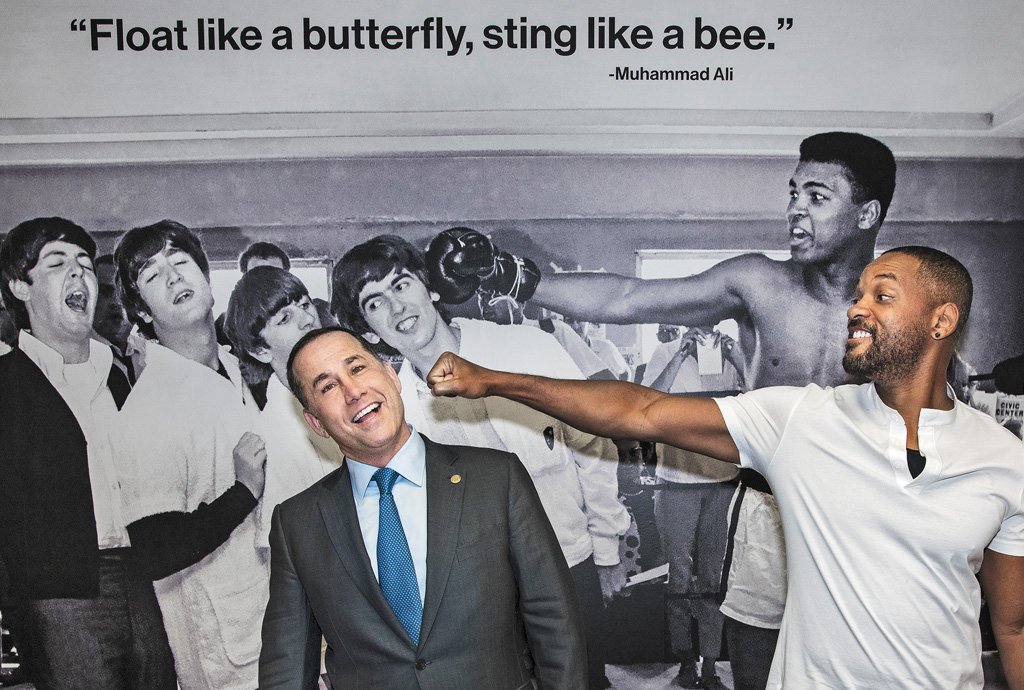
Other than Clinton, were any politicians a model for you?
[Former New York mayor] Michael Bloomberg. If I could be 10 percent as good as him, I’d be very happy. He’ll go down, in my opinion, as one of the greatest American mayors.
OK. So you’ve always thought about getting into politics. What made 2013 the time to do it?
Because I love this city and felt like it was going in the wrong direction. We had a government here that was a little like a mafia. An incestuous cabal that was staying in place and not getting things done.
What things?
Flooding is out of control, we have a terrible convention center, you can’t open a business because you can’t get a permit…
How many of these issues had you encountered in your own business career?
We saw it when we were developing real estate. I heard it from my friends. I’d read it in the papers. The chatter around the city was, “We have a broken government.” And I saw who was running and I thought, You know what? This is my time.
Who were your opponents?
I was running against a gay Hispanic commissioner named Michael Góngora, who was my main opponent. A comedian named Steve Berke. And an Israeli gentleman who’s very unique. [Frequent candidate Raphael Herman, who was notorious for claiming, among other things, that he once took on Osama Bin Laden in a knife fight.]
Was there a watershed moment for you in making the decision?
I was so sick and tired of seeing people run for office or people in office who have two characteristics. Number one, they’ve never been successful at anything in their lives. Number two, they want to run for office to help themselves. These are both horrible characteristics.
I understand that the salary of the mayor of Miami Beach is $10,000…
Ten thousand dollars and benefits.
That’s a bit less than you’re used to.
I immediately passed a resolution that all my money, all the benefits that come from this job, would go to seniors who have trouble getting meals.
Clearly, you don’t need the money. But how could any public office with a salary that low attract good candidates who aren’t wealthy?
I agree. When I said that people should have some accomplishments in their lives, I mean, someone who’s been a great teacher, a great doctor, who’s owned a great small business. People who have achieved something, so they have something to give back.
It’s been reported that you spent almost $2 million on the campaign.
Yup.
For a job that pays 10 grand…
Absolutely. I was running against an entire government, not just one person. So I said, I’m going to run a different, unique campaign out of the box.
How so?
I said, I’m going to meet the voters. And when all my friends were traveling the world and having fun from February to November, having fun in Saint-Tropez, I walked and knocked—I knocked on 6,000 doors. Six thousand. I blew out two pairs of Nike sneakers, and I had my own custom Lululemon shirts made up, because a friend of mine said to me, Philip, if you’re going to do that kind of walking, you better get shirts that are real comfortable.
How long does it take to knock on 6,000 doors?
It took me about seven months. I went through cans of suntan protection spray.
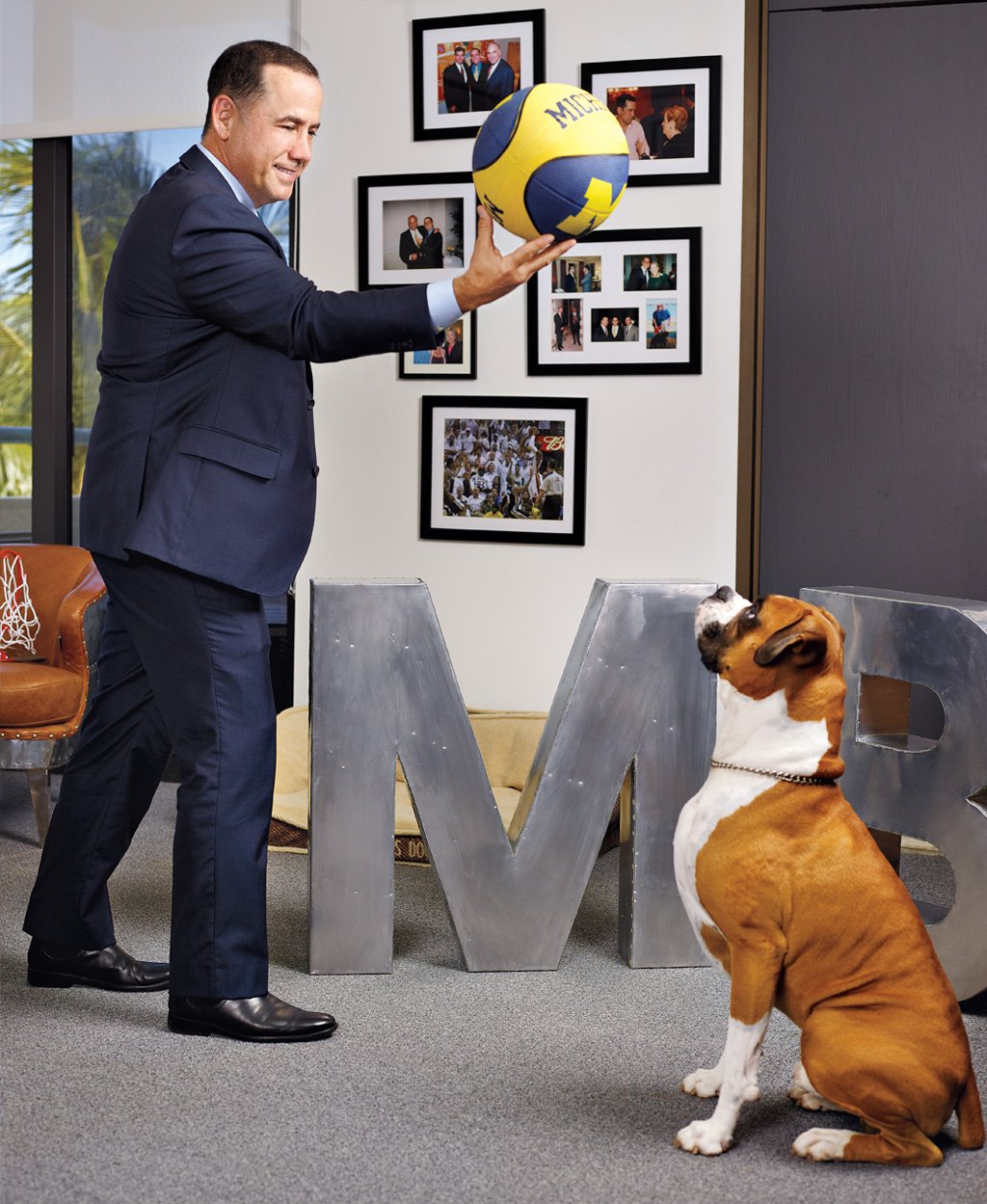
Did you have staff with you?
I was solo. I’d knock on someone’s door and I would say, “Hi, I’m running for mayor of Miami Beach, I just came by to introduce myself and ask if there are any questions you may have about me.”
And what was the typical reaction?
They were taken aback. I just wanted to have that one on one eye contact. I would sneak into a condominium building, start at the top floor and go down the stairwells. I didn’t use the elevators because they had cameras and I would get thrown out. I got thrown out of many buildings. Talk about a humbling experience.
You must have had some interesting conversations.
I would go into little tiny apartment buildings where people were so economically challenged, and I would sit and listen. I had more Cuban coffees with people than you can imagine. I learned so much about my city, because I listened to my customers.
Your customers?
They’re paying the bills. They’re the customers.
You capped donor contributions at $100. What was your reasoning?
I didn’t want anyone giving me a check that felt somehow that their interests were above the interests of my other residents. The other reason is that I wanted people to feel included—for a nominal amount. And the third reason was that I’ve been very successful in my life, I wanted to give back to the city by investing in my own campaign. I spent $2 million running for office, and I would have spent more.
Your opponents charged that you were buying the election. How did you respond?
I don’t need to hide from success. I’m a self-made guy, and I made it legally and honestly. I had no desire to hide who I am.
You didn’t get a lot of union support during the campaign. Why not?
I knew I was getting no endorsements. What’s amazing about unions and media is, they love the status quo. The police union supported my opponent. The fire union supported my opponent. The AFL-CIO supported my opponent. The Miami Herald couldn’t have been more against me.
How do you explain that?
Failing businesses usually fail from the top. I used to laugh and say that when I started my new business, I made more money in my first year than the Miami Herald made in the last 10. But their editorial board was aggressively against me. They saw a rich guy.
You got Bill Clinton’s endorsement, though.
Two weeks before the election, President Clinton came down and did a press conference with me. The Herald was like, “Are you sure it’s President Clinton?” (Laughs.) These are fakakta companies.
In addition to knocking on doors, you started a novel fundraising campaign.
I coined a new term. I said we’re not going to have fundraisers, we’re going to have friendraisers. So if you wanted to support me, you would host a friendraiser and invite your friends. We would do a targeted mailing to everyone in your neighborhood. We’d bring the wine, the cheese—everything. I would give my stump speech. And we had about 70, 80 friendraisers.
I’m reminded of you starting out your career, on a cruise ship talking to rooms full of people, telling them where to shop and how not to get ripped off—winning their confidence. That experience must have been very helpful.
My experience of working on cruise ships, delivering presentations to people, connecting with them, and at the same time developing a company, learning how to execute and manage people, was the greatest background for leadership in the public arena.
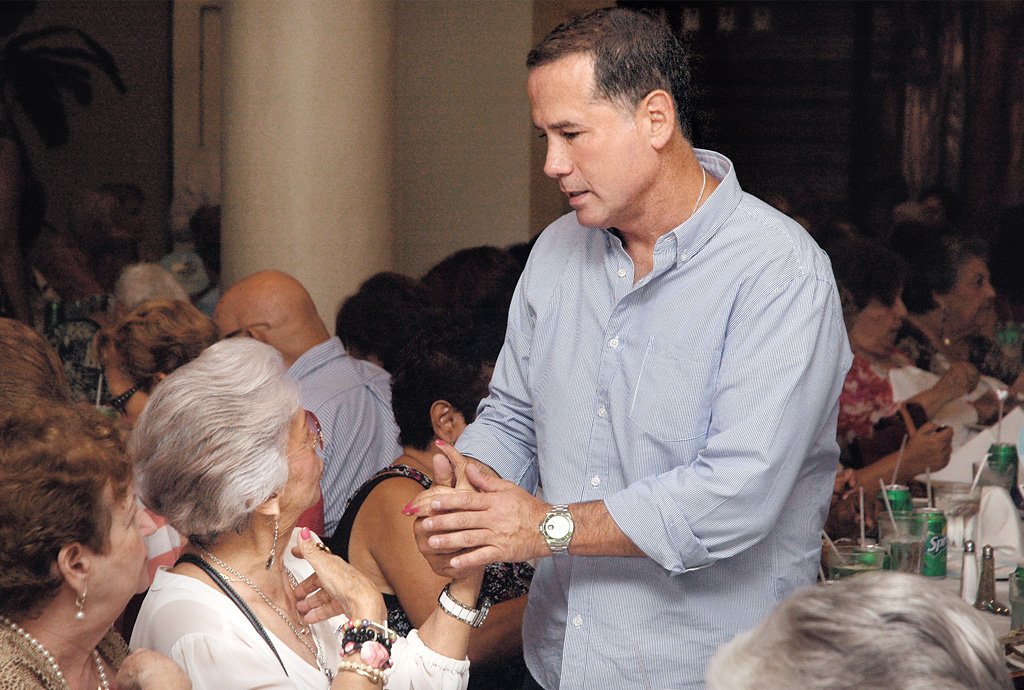
What were your campaign issues?
Number one, our convention center needs to be renovated. It’s old, it’s stodgy, we need to get it done. You had two huge development groups bidding to do it, and elected leaders here that had no real business experience. Their plans were to build a massive convention center, blah blah blah, and by the way the city’s going to put a half a billion dollars into it, but the developer is getting a 99-year lease. I said, Why do we need something so big? We’re Miami Beach. We’re not Atlanta. We are Art Basel. We want boutique shows that are great for our economy. And we don’t need to sell our land. It’s our land, why are we giving it away?
So what was your plan?
They had a deal with a huge New York group already done, and I said, first thing I’m going to do when I’m elected mayor is cancel that deal, bring in the right architects and design a state of the art convention center.
Which you’ve now done. What’s it like to cancel a $500 million deal?
Huge pressure against you. Everyone thinks you’re out of your mind.
And once you’re elected?
Everybody wants to figure out how to get on your good side, even though they’re all against you in the campaign.
So your plan for a new convention center is happening?
It’s already been designed. But I hate the term convention center. I call it the center for creative collaboration. We’re not a convention town.
What comes to mind when you think of convention towns?
I think of Shriners.
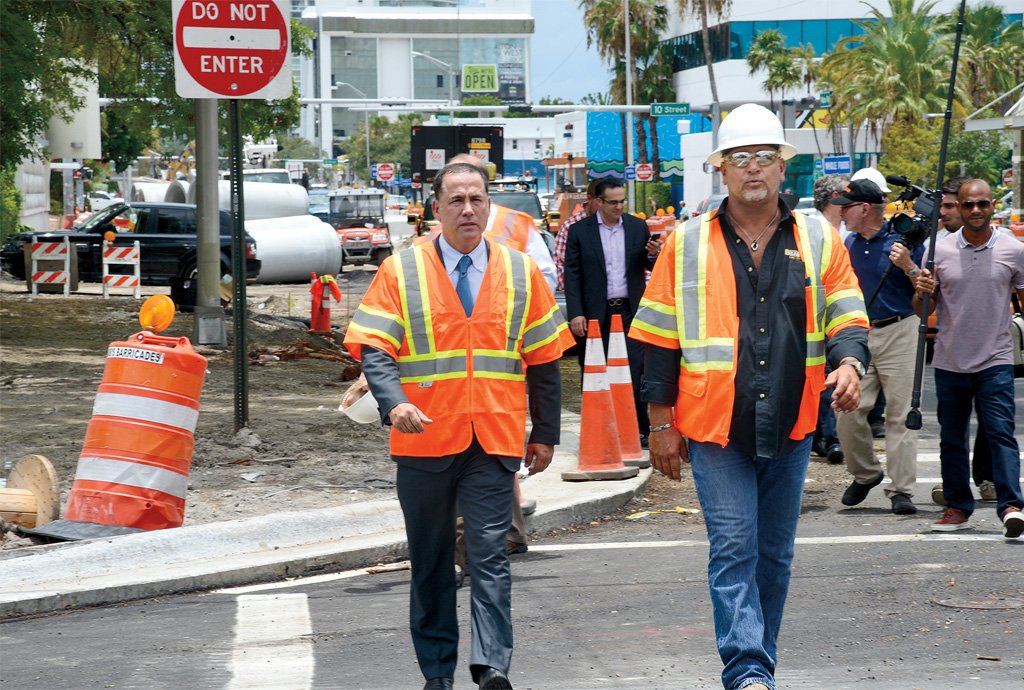
You mentioned the problem of flooding—what’s the problem there?
Our streets have been suffering from flooding. We have flooding when we get heavy rains and the water can’t drain out fast enough. And we have another type of flooding which is more dangerous and scary—we coined a term here, “sunny day flooding.” Sunny day flooding is when it’s a beautiful, sunny day, and the next thing you know, there’s water on the road.
And why is that happening?
Because of climate change, the bay rises higher during certain tides. Our system drains water out of our streets through pipes. The water is treated and goes out into the bay. When the water rises to a certain level and those pipes are under the water level, the water can reverse and go up the drains, and we can have flooding on our streets, which is unsettling to everybody, as you can imagine.
Who was doing the best work in terms of cities on this issue?
No one.
Because in New York, Michael Bloomberg planned extensively for rising water levels.
Right—he was fortifying the city with sea walls. But New York is on bedrock; Miami Beach is on porous limestone. So he was concerned about water coming over. We have it coming up.
So what’s your solution?
We’re putting in major pumps all across the city at hot spots. When the water starts to come up, the pumps immediately pull it out and push it out of the outfalls. The first pumps will be in place by the end of this year.
That sounds expensive.
Three hundred million dollars, at least. But we did a survey that found that 87 percent of the people said they would pay more in fees to combat rising tides.
So you don’t have many climate change disbelievers here in Miami Beach?
As a mayor, I don’t have the liberty to debate climate change. I just have to fix the problem we’ve got.
The city has also had problems with police corruption, right?
The majority of our police officers are amazing, but we’ve had leadership issues. One of the campaign promises I made is that I’m going to do a full audit of the police department using a professional organization—and based on their recommendations we’re going to make the necessary changes.
You’re taking on some forces that have more tangible structural power than the office of mayor here does.
Well, that’s the beauty of being a Bloomberg-esque type mayor.
Is there any precedent for that in your business experience?
When I started my companies, I was the first to go on the cruise ships and bust up what was going on, when all the cruise directors were making their money. Not everybody loved me.
Policy goals aside, are you enjoying the job? Are you having fun?
I love every minute.
Every minute? There’s nothing about this that you don’t like?
I wake up every morning and I’m so happy I’m mayor.
Your term is up next year. Will you run again?
Definitely.

